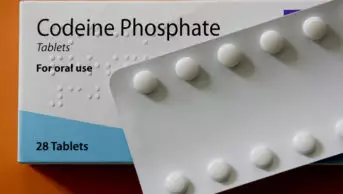Opioid prescribing is a necessary component of post-operative pain management but carries a risk of misuse and dependency formation1. Community pharmacists are uniquely placed to contribute to effective opioid stewardship2. We previously reported on potentially valuable entries on PharmOutcomes by community pharmacies when responding to a discharge medicines service (DMS) referral for patients discharged on two classes of high-risk drugs — anticoagulants and weak opioids3. We have now looked more explicitly at the patient cohort discharged on codeine or dihydrocodeine post-hip or knee surgery. These patients admitted for elective surgery are intended to have a defined short-term duration of the weak opioid following discharge. Prior to discharge, the hospital pharmacy team aim to record a discharge medicine reconciliation (DMR) note on the hospital electronic prescribing system for these patients4. The note provides confirmation that the patient has been discharged with sufficient analgesia and states that if they present with a prescription for further analgesia, then advice should be given that it will need to be weaned and only used short-term, with further requests potentially indicating a postoperative complication or inappropriate continuation of opioid and should not be dispensed without medical review. This note also appears in the discharge letter for the patient’s GP and in the DMS referral.
Several secure electronic referral platforms between acute hospitals and community pharmacy are available. PharmOutcomes allows electronic messages to be sent from the hospital pharmacy to a specific community pharmacy on patient discharge. Upon receipt of such a referral, community pharmacies either tick accept (acknowledging the referral but not yet able to action it), complete it (by providing some or all of the service), or reject it. The referral status remains as referred if none of the aforementioned options are chosen. A record of action taken and/or other relevant notes are recorded within PharmOutcomes by the community pharmacy team.
Accepting that entries in PharmOutcomes may not necessarily always translate into appropriate action or intervention by community pharmacy teams when dispensing for and counselling these patients, we have analysed further the free text notes made on PharmOutcomes for this patient cohort.
Data were downloaded from PharmOutcomes at the end of June 2024 for patients in our secondary care NHS Trust who had consented to a DMS over 12 months from 1 April 2023 to 31 March 2024.
Of the DMS referrals from the relevant hospital ward where hip or knee surgery (plus other surgical procedures) occur, 347 were completed on PharmOutcomes. Codeine or dihydrocodeine was mentioned in the discharge medication list for 215 of these patient spells, of which 72 (mean age 68, 49% female)(33%) also attracted the DMR note in the referral. These 72 episodes were completed (any of stage 1, 2 or 3 of the DMS) across 35 pharmacies, of which 14 (40%) pharmacies recorded an entry on PharmOutcomes relating to 19 individual patients.
Examples of such notes include:
- “Meds supplied from the hospital for short-term use only, should not have any opioid analgesics prescribed without medical review as may indicate postoperative complications.”
- “Aspirin started as post-operative prophylaxis of blood clots. Short course of opioids not to be continued.”
- “Note to say if more analgesia required patient should be counselled to wean off. Discussed clopidogrel and omeprazole but patient preference to stay on omeprazole. Note to review.”
In contrast, there were 143 completed episodes (mean age 69, female 59%) across 57 pharmacies that did not receive the DMR note. Only nine (16%) of these pharmacies made an entry on PharmOutcomes relating to nine individual patients.
Six of the nine community pharmacies making a patient specific entry, despite not receiving a DMR note as part of the referral, had also made an entry in response to receiving the relevant DMR note for a different patient within the 12 month period of this review.
It is uncertain how the workflow processes resulting from completing a DMS referral operate in typical community pharmacy practice. For instance, acceptance of the DMS referral with the DMR note as part of medicines reconciliation (DMS stage 1) may stimulate a written entry on the pharmacy patient medication record (PMR). This PMR record then prompts action at stage 2 or stage 3 of the DMS. A pharmacy team member who previously received a DMS referral from the relevant hospital ward that did include the DMR note for a patient on a weak opioid would perhaps not automatically assume to extrapolate the principles behind this note to other similar DMS referrals received without the DMR note. Others have reported on the impact from DMS of recording data in different places and being able to demonstrate outcomes as a result of the service5.
When a DMS was added in the referral note, a higher proportion of community pharmacies subsequently added a PharmOutcomes note, highlighting the value of adding this step at discharge. Further work is required to understand why only 33% of the 215 of the DMS referrals did include the relevant DMR note from the hospital pharmacy team. This may be because discharges that occur over the weekend are not reviewed by the hospital pharmacy team, meaning the DMR note is not added when discharge medicines are supplied. In addition, it would be useful to understand variations in use of PharmOutcomes by community pharmacies, and furthermore whether such a community pharmacy check on ongoing supplies of the weak opioid for this patient cohort could be in place, even if the hospital DMR prompt is missing, to avoid an acute prescription of opioids inadvertently becoming a repeat prescription2.
Mike Wilcock, Pharmacy Department, Royal Cornwall Hospitals NHS Trust
Andrew Bastin, Pharmacy Department, Royal Cornwall Hospitals NHS Trust
Nick Kaye, Community Pharmacy Cornwall
Correspondence to mike.wilcock@nhs.net
- 1.Levy N, Quinlan J, El‐Boghdadly K, et al. An international multidisciplinary consensus statement on the prevention of opioid‐related harm in adult surgical patients. Anaesthesia. 2020;76(4):520-536. doi:10.1111/anae.15262
- 2.Surgery and Opioids: Best Practice Guidelines. Faculty of Pain Medicine; 2021. Accessed August 2024. https://fpm.ac.uk/sites/fpm/files/documents/2021-03/surgery-and-opioids-2021_4.pdf
- 3.Wilcock M, Bastian L, Jones A, Baqir W. Community pharmacy discharge medicines service activity as recorded in PharmOutcomes: a retrospective exploration and analysis. International Journal of Pharmacy Practice. 2024;32(4):274-279. doi:10.1093/ijpp/riae021
- 4.Wilcock M, Bastin A, Tsoi V, Mitchell K. Involving Community Pharmacy in Communication about Post-Surgery Opioid Use: An Observational Study. ; 2023:5:6-13. Accessed August 2024. https://www.pmhealthcare.co.uk/uploads/Journals/PM%20Healthcare%20Journal%20-%20Summer%202023_FINAL_2.pdf
- 5.Twigg M, Nazar H. Evaluation of Discharge Medicine Service (DMS) Referrals from Mental Health Trusts to Community Pharmacies in the East of England. ; 2022. Accessed August 2024. https://www.easternahsn.org/wp-content/uploads/2022/07/DMS-Mental-health-report-v1.2-25.05.2022.pdf


